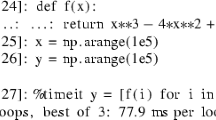Abstract
Python became the preferred language for teaching in academia, and it is one of the most popular programming languages for scientific computing. This wide popularity occurs despite the weak performance of the language. This weakness is the motivation that drives the efforts devoted by the Python community to improve the performance of the language. In this article, we are following these efforts while we focus on one specific promised solution that aims to provide high-performance for Python applications.
Access this chapter
Tax calculation will be finalised at checkout
Purchases are for personal use only
Similar content being viewed by others
References
Guo, P.: Python is Now the Most Popular Introductory Teaching Language at Top U.S. Universities. 7 July 2014. http://cacm.acm.org/blogs/blog-cacm/176450-python-is-now-the-most-popular-introductory-teaching-language-at-top-us-universities/fulltext
Most Popular Coding Languages of 2016. 2 February 2016. http://blog.codeeval.com/
TIOBE Index. http://www.tiobe.com/tiobe-index/
IEEE Spectrum ranking. http://spectrum.ieee.org/computing/software/the-2016-top-programming-languages
Scipy. http://www.scipy.org/
Numpy. http://www.numpy.org/
Matplotlib. http://matplotlib.org/
Marowka, A.: On parallel software engineering education using Python. Educ. Inf. Technol. 23, 357–372 (2017). Springer
PyPy. http://pypy.org/
Numba. http://numba.pydata.org/
A Speed Comparison of C, Julia, Python, Numba and Cython on LU Factorization. https://www.ibm.com/developerworks/community/blogs/jfp/entry_Comparison_Of_C_Julia_Python_Numba_Cython_Scipy_and_BLAS_on_LU_Factorization?lang=en
PyPy Speed Center. http://speed.pypy.org/
Cython. http://cython.org/
Numexpr. https://github.com/pydata/numexpr
Python Multiprocessing module. https://docs.python.org/2/library/multiprocessing.html
Anaconda Accelerate. https://docs.continuum.io/accelerate/
Anaconda Python. https://www.continuum.io/downloads
Python threading module. https://docs.python.org/3.3/library/threading.html
Volkov, V., Demmel, J.: Benchmarking GPUs to tune dense linear algebra. In: Proceedings of ACM/IEEE Conference on Supercomputing (SC 2008), pp. 31:1–31:11. IEEE Press, Piscataway (2008)
Author information
Authors and Affiliations
Corresponding author
Editor information
Editors and Affiliations
Rights and permissions
Copyright information
© 2018 Springer International Publishing AG, part of Springer Nature
About this paper
Cite this paper
Marowka, A. (2018). Towards High-Performance Python. In: Wyrzykowski, R., Dongarra, J., Deelman, E., Karczewski, K. (eds) Parallel Processing and Applied Mathematics. PPAM 2017. Lecture Notes in Computer Science(), vol 10778. Springer, Cham. https://doi.org/10.1007/978-3-319-78054-2_19
Download citation
DOI: https://doi.org/10.1007/978-3-319-78054-2_19
Published:
Publisher Name: Springer, Cham
Print ISBN: 978-3-319-78053-5
Online ISBN: 978-3-319-78054-2
eBook Packages: Computer ScienceComputer Science (R0)




